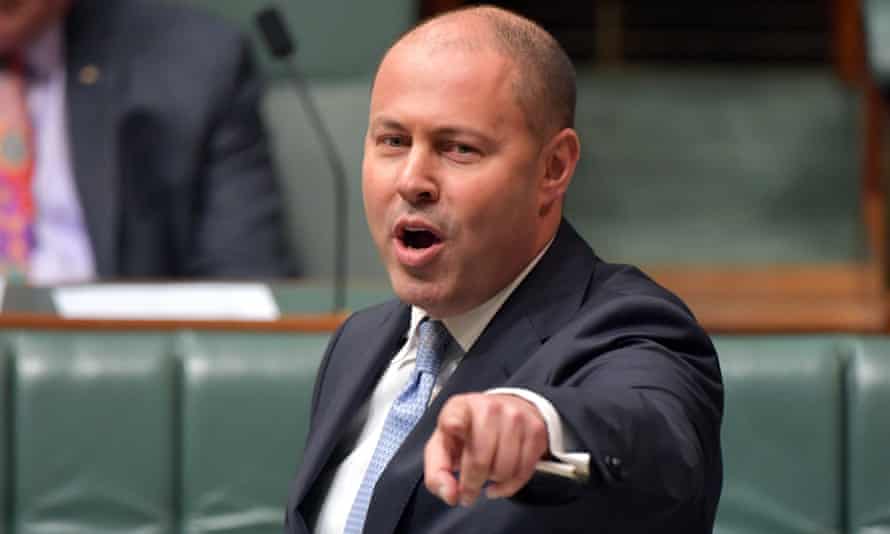Extract from The Guardian
Treasurer Josh Frydenberg signals sector-specific support will replace the pandemic wage subsidy but dashes hopes of rise in jobseeker payment.

Last modified on Sun 31 Jan 2021 14.10 AEDT
Josh Frydenberg has signalled the jobkeeper wage subsidy will be terminated after March, and the government will also be reluctant to bake in a permanent, significant increase to unemployment benefits.
The treasurer used an appearance on the ABC on Sunday to flag that sector-specific support, like a package for tourism, would replace the popular pandemic wage subsidy after March “based on what we know today”, and he declared it was time for state governments to increase their fiscal support.
When it came to the jobseeker payment, which is the old Newstart with a Covid-19 supplement added that doubles the rate, Frydenberg said the government had made a point during the pandemic of not baking in structural spending – spending that carries on in perpetuity.
Asked about the outlook for jobseeker after March, the treasurer said “every dollar we’ve spent through this crisis is a borrowed dollar” and he noted that thus far, “we haven’t built in structural spending for the longer term”.
The government has been under sustained pressure from a range of groups, including business organisations, economists and the social services sector, as well as some of its own MPs, to raise the rate of the unemployment benefit because the pre-pandemic payment is insufficient to support people trying to prepare themselves for work.
But Frydenberg’s signal on Sunday suggests the government is not contemplating a significant, permanent increase to unemployment benefits.
With the international and domestic border closures continuing to put tourism operators under pressure, and with calls to maintain jobkeeper to keep ailing businesses afloat, Frydenberg declared it was time, 12 months into the pandemic, for state governments to step up with fiscal support.
The new tourism minister, Dan Tehan, has confirmed that the government is working up a package of targeted support because international travel is likely to remain restricted for up to a year, and federal MPs are also pushing for additional measures.
Frydenberg said sector-specific support was under consideration, but also noted Canberra had “delivered more than three times the amount of money to Queenslanders than the Annastacia Palaszczuk government has ever committed to – so I’d welcome the state government in Queensland making more of a commitment”.
The treasurer also pointed out that tourism operators had lost revenue over the summer because state governments had closed their borders after the Covid-19 outbreak in Sydney in December.
Frydenberg said the Qantas chief Alan Joyce had told him the recent Queensland border closure had triggered mass cancelation of bookings. Qantas and Jetstar had cancelled 1,500 flights and 200,000 passenger bookings because of the border closures that followed Sydney’s northern beaches cluster.
But the Morrison government also embarked on its own border closure during the summer. Australia suspended its travel bubble with New Zealand for a few days after a confirmed case of a highly transmissible Covid-19 variant was identified in a woman who had been out and about in the community.
Frydenberg said that decision was based on the advice of the Australian Health Protection Principal Committee and it was “a unified approach by the central body involving the states as well”.
The treasurer also argued on Sunday that businesses that had managed to improve their profitability during the public health crisis weren’t required to pay back jobkeeper subsidies, because the government had not mandated repayments.
It was pointed out to Frydenberg during his appearance on the ABC on Sunday that the government appeared to have one rule for overpayments with jobkeeper and another, more punitive rule, for welfare debts as evidenced through the robodebt debacle.
The treasurer said he would “welcome any business that decided to pay that money [in jobkeeper payments] back” to the government.
Super Retail Group has voluntarily returned $1.7m of wage subsidies to the Australian government and the carmaker Toyota has returned $18m to the federal government.
Frydenberg said profitable companies with the capacity to repay the government for jobseeker support “should do it” but he said the government did not intend to mandate repayments because “that was not what [businesses] signed up to when they took the jobkeeper payments in phase one”.
No comments:
Post a Comment